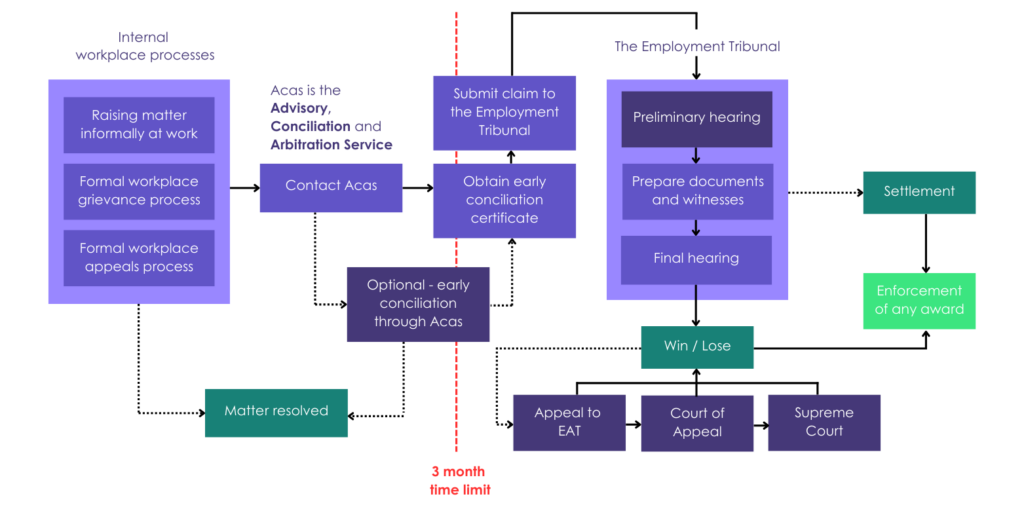Why Employment Tribunals Matter More Than Ever
An Employment Tribunal in England is a specialist legal body that resolves disputes between employers and employees. Common cases include unfair dismissal, discrimination, wage disputes, and breaches of employment contracts. Compared to traditional courts, employment tribunals are more accessible and less formal, but failing to prepare properly can lead to severe consequences for businesses.
The Employment Tribunal Process

Resource: UK House of Commons Library
Employment Tribunal cases have risen sharply in recent years, placing immense pressure on the system. According to the UK government, in the final three months of 2024 alone,
- 11,000 new claims were submitted
- Only 9,600 cases were resolved
- Leaving a backlog of 43,000 open cases
Some cases now take over two years to reach a hearing, creating uncertainty for both employers and employees. One case involved a cancer patient whose tribunal was repeatedly delayed, leaving him fearing he may not live to see justice.
Beyond the backlog, tribunal claims pose significant financial risks. According to The Guardian, the UK government estimates that employment rights reforms could cost businesses up to £5 billion annually, affecting expenses related to sick pay, paternity leave, zero-hour contracts, and administrative burdens.
Additionally, major UK retailers such as Asda, Tesco, and Sainsbury’s face multi-billion-pound equal pay settlements, showing how failing to address workplace disputes early, as reported by the Financial Times.
This crisis highlights the need for HR professionals to proactively manage workplace disputes and prevent costly, time-consuming tribunal claims. Without proper training, businesses risk severe financial, operational, and reputational damage.
(Download the Report UK employment law changes in 2025 to stay ahead.)
Understanding the Most Common Employment Tribunal Claims
Employment Tribunal cases cover a range of disputes, with some categories being more common than others. UK government reports that the most frequent claims include:
1. Unfair Dismissal: Employees claim their termination was unlawful or unjustified
Case Study: Jon Reeves v Goldman Sachs International (Case No: 2209024/2022), involved a senior employee who was dismissed during his paternity leave after raising concerns about balancing work and childcare responsibilities. The tribunal ruled the dismissal procedurally unfair, stating that the company failed to follow a fair process and did not properly consider the challenges faced by working parents. This case highlights the importance of fair disciplinary procedures and equitable treatment in avoiding unfair dismissal claims.
2. Redundancy Payments: Disputes arise when employees believe their redundancy compensation is insufficient or unfairly handled
Case Study: Mrs. C. Davis v. Folio Print Finishing Limited (Case No: 1403398/2020), where the claimant alleged unfair dismissal and sought a redundancy payment. The tribunal examined whether the claimant was genuinely redundant and entitled to such payment, considering factors like the availability of suitable alternative employment and the reasonableness of any refusal thereof. This case underscores the importance of employers conducting fair redundancy processes and offering appropriate compensation to mitigate legal disputes.
3. Discrimination: Cases under the Equality Act 2010 encompass age, gender, disability, and race discrimination
Case Study: Nikita Twitchen v Genu Prima Ltd (Case No: 1601455/2023), where the claimant was dismissed shortly after announcing her second pregnancy while on maternity leave. The tribunal found the dismissal discriminatory, citing inconsistencies in the employer’s reasons for redundancy and a significant shift in their behaviour post-announcement. This case underscores the importance of equitable treatment and adherence to fair procedures to prevent discrimination claims.
4. Wage Disputes: Employees may claim unpaid wages, unlawful deductions, or failure to meet minimum wage requirements
Case Study: Miss A. Goddard v. Bluerock Developments Ltd (Case No: 2411279/2023), where the claimant sought payment for wages owed during her employment. The tribunal found in favour of Miss Goddard, awarding her £4,876.56 in unpaid wages, highlighting the employer’s failure to meet the national living wage requirements. This case underscores the importance for employers to adhere strictly to wage laws to avoid legal disputes. Additionally, in 2023, UK employees claimed over £250 million in unpaid wages and redundancy pay, highlighting the scale of wage disputes.
5. Breach of Employment Rights: Issues related to working conditions, contractual breaches, and whistleblowing protections can lead to significant legal disputes
Case Study: Mr. P. McCullen v. University of Brighton (Case No: 2302456/2022), where the claimant alleged constructive unfair dismissal, asserting that the university’s conduct amounted to a fundamental breach of contract, compelling his resignation. The Employment Tribunal concluded that the respondent’s actions did not constitute a breach of contract or statutory employment rights that would entitle the claimant to resign or claim compensation, resulting in the dismissal of all claims.
Understanding these claims helps HR teams implement preventative measures to protect businesses from legal action.

How HR Can Reduce the Risk of Work Tribunals in the UK
Ignoring tribunal risks is no longer an option. HR teams can take proactive steps to minimise disputes, protect their organisation, and ensure compliance with employment law.
1. Strengthen Workplace Policies and Training
- Ensure clear employee handbooks, disciplinary procedures, and grievance policies are in place.
- Train managers to handle disputes fairly and lawfully, reducing the risk of claims.
2. Maintain Accurate Documentation
- Keeping detailed records of performance reviews, disciplinary actions, and termination decisions ensures employers have crucial evidence if needed.
- Be mindful that emails, WhatsApp messages, and internal communications could be disclosed as evidence in a tribunal.
3. Encourage Early Resolution
- Engage in internal mediation before disputes escalate to a tribunal.
- Use Acas Early Conciliation, a free service helping employers and employees resolve disputes without legal proceedings.
4. Ensure Witnesses and Legal Support Are Prepared
- Train employees who may need to act as witnesses so that their statements are clear, factual, and consistent.
- Consider legal guidance or employment tribunal training for HR teams to improve case management skills.
5. Leverage Mock Tribunals for Practical Experience
- Mock tribunals provide HR professionals with hands-on experience in handling tribunal cases, allowing them to develop essential skills in evidence presentation, cross-examination, and legal decision-making. Avado, in collaboration with Acas, ensures that these mock tribunals reflect real tribunal proceedings, guided by industry experts and employment law specialists. (Explore: Avado offers two mock employment tribunals for CIPD Level 5 Plus programme)
What to Do If an Employer Faces a Tribunal Claim
If an employer is served with a tribunal claim, taking the right steps early can significantly impact the outcome.
HR teams should:
1. Acknowledge the Claim Promptly
Responding to the ET1 form within 28 days with a clear and factual ET3 defence form is crucial to presenting a strong case. Seeking legal advice early, especially for complex cases, can help strengthen the defence and improve the chances of a favourable outcome.
2. Review and Gather Evidence
Collect performance reviews, disciplinary records, contracts, and emails that support their position, ensuring all relevant documentation is well-organised. Additionally, witness statements must be detailed and consistent to provide a strong and credible defence during the tribunal process.
3. Consider Mediation Before a Hearing
Evaluating whether settlement or early resolution is preferable to a full tribunal process can help minimise risks. Mediation can be an effective strategy to prevent reputational harm and reduce excessive legal costs.
4. Prepare for the Tribunal Hearing
Ensuring legal representation or HR professionals are well-versed in the tribunal process is essential for a strong defence. Attending case management hearings helps clarify key issues before the full hearing, improving preparation and strategy.

The Importance of Mock Tribunals in HR Training
Employment tribunals can be complex, high-stakes situations where HR professionals must navigate legal arguments, present evidence effectively, and ensure procedural fairness. However, many HR teams lack direct experience with tribunal proceedings until they face a real case—when the risks are highest.
Mock tribunals provide a safe and practical learning environment where HR professionals can experience the full tribunal process, from case preparation to cross-examination. By simulating real-world cases, HR teams can better understand how legal arguments unfold, identify common pitfalls, and improve their ability to manage workplace disputes proactively. This hands-on exposure helps HR professionals refine their approach to documentation, witness preparation, and dispute resolution—ensuring they are better equipped to handle real tribunal cases with confidence and competence.
FAQs: Employment Tribunals in England
1. What is an Employment Tribunal in England?
An Employment Tribunal is a legal body that handles disputes between employees and employers, covering unfair dismissal, discrimination, wage disputes, and contract breaches.
2. How long does a workplace tribunal in the UK take?
According to UK government report, tribunal cases typically take between 9 and 18 months to reach a hearing, depending on complexity and location.
3. How can employers reduce the risk of tribunal claims?
Employers can minimise the risk of tribunal claims by implementing clear policies, maintaining accurate records, encouraging early resolution, and ensuring HR teams are well-trained in employment law.
4. What is a Mock Tribunal, and how does it help HR professionals?
A Mock Tribunal is a simulated tribunal hearing where HR professionals can practise handling disputes, presenting evidence, and defending claims in a controlled environment. This experience helps HR teams develop confidence in managing real cases effectively.
Strengthening HR’s Role in Tribunal Prevention
HR professionals play a critical role in mitigating tribunal risks by implementing strong workplace policies, maintaining meticulous documentation, and fostering early dispute resolution. Investing in ongoing legal education and proactive HR strategies can help prevent costly claims and protect both employees and employers.
Why Choose Avado to Advance Your HR Skills?
Avado’s CIPD Level 5 Plus programme goes beyond theory, offering expert-led training, real-world case studies, and live mock employment tribunals to give HR professionals hands-on experience in handling workplace disputes. With flexible online learning, industry-recognised accreditation, and practical legal insights, Avado ensures that HR teams are equipped to navigate the complexities of employment law with confidence.
 8 min read
8 min read 






